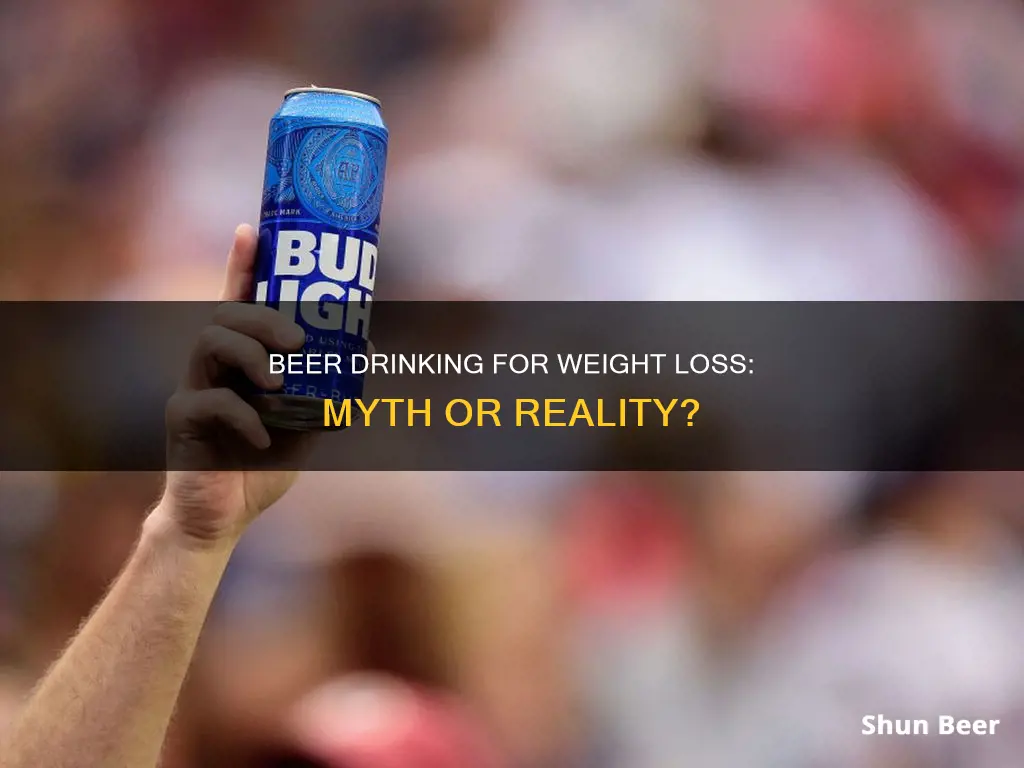
Beer drinking and weight loss are not typically associated with one another. The idea of a beer belly is a common one, and beer is often thought to be a major contributor to weight gain. However, some evidence suggests that drinking beer in moderation and making certain dietary adjustments may not hinder weight loss efforts. Additionally, a compound in hops called xanthohumol has been found to aid weight loss, although the amount of beer one would have to consume to gain this benefit is impractical.
What You'll Learn
- Beer is an empty calorie with no nutrients, so it's easy to drink lots of calories very quickly
- Alcohol stops the body from burning fat and increases appetite
- Beer can negatively affect your sleep, which is linked to weight gain and muscle loss
- Beer may inhibit your self-control, making you more likely to overeat
- Drinking beer in moderation is possible, but it's important to be mindful of calorie intake

Beer is an empty calorie with no nutrients, so it's easy to drink lots of calories very quickly
Beer is an empty calorie drink, meaning it provides almost no nutrients, so it is easy to drink lots of calories very quickly. Beer is a liquid, and liquids are easier for the body to process than solid foods. This means that calories from beer are absorbed faster than calories from food. Beer also contains alcohol, which is metabolised differently from other macronutrients like protein, carbohydrates, and fat. Alcohol can stop the process of fat burning completely.
The foundation of losing weight is to eat fewer calories than you burn while staying full. That’s why eating whole foods like meat, vegetables, and fruit is an effective strategy for losing weight. These foods fill you up but provide fewer calories. On the other hand, drinking five beers (approximately 750 calories) will not fill you up, and you will still have room in your stomach for a full meal afterward. This is why drinking beer can make losing weight very difficult.
Additionally, drinking alcohol can reduce your inhibitions and stimulate your appetite, leading to increased food consumption. People often eat more when drinking, so if you know you'll be tempted to snack after a beer or two, it's important to plan ahead and prepare low-calorie snack options.
Beer Hour: Understanding the Social Drinking Culture
You may want to see also

Alcohol stops the body from burning fat and increases appetite
Alcohol can stop the body from burning fat. When we drink alcohol, it temporarily stops our body from burning fat, as the body can't store calories from alcohol in the same way it does for food. Therefore, the metabolic system prioritises getting rid of alcohol first, and whatever we ate prior to drinking will get stored as fat. Alcohol decreases fat burn, which is why we often hear about people getting a "beer belly".
For example, a UC Berkeley study in the American Journal of Clinical Nutrition found that people who drank an ounce of alcohol from two cocktails experienced a 73% decrease in fat burning after two hours. The consumption of large quantities of alcohol adds calories and has a negative effect on the body's fat-burning ability. It takes at least an hour for the liver to process a standard drink, so drinking a beer in under an hour will lead the body to slow down its fat-burning ability and store more fat.
Alcohol can also increase appetite. Alcohol reduces inhibitions and stimulates your appetite. People often eat more when drinking, so if you know you'll be tempted to snack after a beer or two, it's best to plan ahead. Prepare low-calorie snack options so that you'll stay on track with your daily calorie intake.
However, it is possible to drink beer and still lose weight. The key is to drink in moderation and be conscious of the calories you are ingesting with each drink. Switching to a light beer is a great way to reduce your caloric intake but still enjoy a drink. The USDA lists 103 calories in a light beer, compared to 153 in a regular beer. In addition, light beer contains about half the carbohydrates of regular beer, and lower-carb diets are often associated with weight loss.
Beer and Gym: Drinking After a Workout, Good or Bad?
You may want to see also

Beer can negatively affect your sleep, which is linked to weight gain and muscle loss
Getting a good night's rest is also important for maintaining your energy levels and the quality of your workouts. If you're well-rested, you're more likely to feel motivated to exercise and will probably have a better workout. On the other hand, if you're tired and sluggish from a poor night's sleep, you may be less inclined to stick to your exercise routine and may not perform at your best.
To minimise the impact of beer on your sleep, it's a good idea to limit your beer intake and be mindful of how it affects your sleep quality and duration. You might also consider drinking non-alcoholic beer or choosing a different beverage altogether to avoid the sleep-disrupting effects of alcohol.
Beer Drinking: Nightly Habit and Its Health Impact
You may want to see also

Beer may inhibit your self-control, making you more likely to overeat
When you combine less self-control with food, you get a situation that can derail an entire week of hard work. Whether you are drinking beer at a meal or going out at night with friends, you will likely eat more food than if you hadn't consumed any alcohol. This is because alcohol can stop the process of fat burning completely. It takes at least an hour for the liver to process a standard drink, so drinking one beer in under an hour will lead the body to slow down its fat-burning ability and store more fat.
Additionally, beer is an "empty calorie" because it provides almost no nutrients, and it is in liquid form, which means you can drink calories very quickly. If you drink five beers, you will still have plenty of room in your stomach to have a full meal right after. This is why drinking beer can make losing weight very difficult.
Antacids and Beer: A Safe Mix?
You may want to see also

Drinking beer in moderation is possible, but it's important to be mindful of calorie intake
Drinking beer in moderation is possible, but it's important to be mindful of your calorie intake. Beer is often associated with weight gain, and it's true that it can be challenging to lose weight if you regularly consume beer and calorie-rich foods. Beer provides calories without satisfying your hunger, and alcohol can stop the process of burning fat completely.
However, this doesn't mean you need to cut beer out of your life entirely. Moderation is key, and by being mindful of your calorie intake, you can still enjoy a beer without sabotaging your weight loss goals. Here are some tips to help you drink beer in moderation while maintaining a healthy weight:
- Be conscious of the calories in each drink. According to the USDA, a regular beer contains about 153 calories, while a craft beer can have 171 calories or more. Light beers are typically lower in calories, with the USDA listing 103 calories in a light beer.
- Limit the number of beers you drink per week. The fewer beers you consume, the fewer empty calories you ingest. Consider setting a specific beer limit for yourself, such as one beer a day or two beers on the weekend.
- Adjust your eating habits based on your drinking habits. If you're having a burger with a couple of beers, opt for lean protein sources and veggies instead of fries or other high-calorie sides.
- Drink water before, during, and after consuming beer. Alcohol is a diuretic, which means it will dehydrate you. Drinking water will help prevent dehydration and may also prompt you to drink beer more slowly.
- Choose healthier drink options. Opt for light beers or low-carb beers, which have fewer calories and carbohydrates. Clear spirits with soda water or a glass of wine are also lower-calorie options compared to cocktails.
- Don't skip meals, but be mindful of what you eat. Eat a healthy dinner full of lean protein and good fats before drinking. This will help slow down the absorption of alcohol into your bloodstream and may reduce the likelihood of binge eating later.
- Increase your exercise. To lose weight, you need to burn more calories than you consume. High-intensity interval training (HIIT) and heavy resistance training can help increase your body's ability to burn calories, even when at rest.
By following these strategies, you can enjoy drinking beer in moderation while maintaining a healthy weight and working towards your weight loss goals.
Beer Ads: What Doesn't Work and Why
You may want to see also
Frequently asked questions
Drinking beer will not help you lose weight. Beer is calorie-dense and can negatively impact your sleep, which is directly linked to weight gain. However, you can still enjoy a beer or two without sabotaging your weight loss goals by practising moderation and making adjustments to your diet and exercise routine.
Beer provides calories without satisfying your hunger. It is an "empty calorie" drink, lacking nutrients, and its liquid form allows you to consume calories quickly. Additionally, alcohol can stop the process of fat burning and reduce your inhibitions, leading to increased snacking and calorie intake.
To lose weight, you need to consume fewer calories than you burn. Here are some strategies to achieve that while still enjoying beer:
- Limit your beer intake. One or two beers a week is a good starting point.
- Adjust your eating habits. Consume fewer calories and focus on lean protein sources and vegetables.
- Switch to light beer, which has fewer calories and carbohydrates.
- Drink water before, during, and after consuming beer to stay hydrated and reduce the negative impacts of alcohol, which is a diuretic.
- Drink slowly and steadily to give your body time to metabolise the alcohol.
- Indulge in protein before or during drinking to curb your beer intake and control blood alcohol levels.
While beer is not a weight-loss-friendly drink, it does have some health benefits. Studies show that beer can help prevent kidney stones, strengthen bones, and aid digestion. Additionally, a compound called xanthohumol, found in hops, has been linked to potential weight loss and reduced risk of cardiovascular disease and type-2 diabetes. However, the amount of xanthohumol in a pint of beer is negligible, and further research is needed to determine its safety and efficacy for humans.







